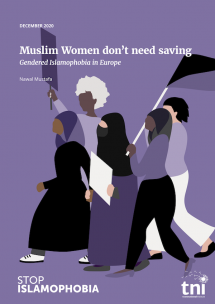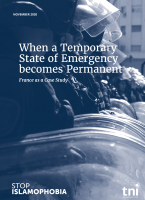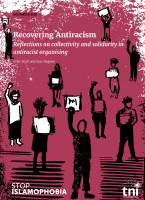Muslim Women don’t need saving Gendered Islamophobia in Europe
Upon declaring a Global War on Terror in 2001, the US administration claimed that the “fight against terrorism was also a fight for the rights and dignity of women”. In the years that followed, western political discourse regularly referred to the need to “free” apparently oppressed Muslim women from the shackles of their religion and way of life, reviving political and societal debates about head coverings, integration, gender equality, secularism, and neutrality.
Relying on Islamophobic stereotypes, and with no regard for the rights to freedom of expression or freedom of religion, laws and policies were introduced in a number of European countries, which banned the hijab and/ or niqab. In perhaps the most flagrent example of just how entrenched Islamophobia has become, European states, in effect, began legislating on Muslim women’s bodies, dictating which clothes they could or could not wear.

Authors
Download the full report here.
In the post 9/11 era, political discourse increasingly pointed towards an apparent incompatibility between what it is to be European and what it is to be Muslim; it seemed impossible to be both. Although anti-Muslim rhetoric has implications for all Muslims, much of the legislation rolled out and the policies implemented either specifically target, or disproportionately affect, Muslim women.
Much can be said about the increased policing of Muslims collectively and the systematic targeting of Islamic places of worship, but Muslim women, in particular, have borne the brunt of state led, racist laws and policies. Those who wear head coverings and Islamic attire are easily identifiable and have thus become easy targets. Following bans on Islamic dress, Muslim women have found themselves increasingly vulnerable and exposed to gendered Islamophobic attacks, while their rights to religious freedom, freedom of expression, equality and non-discrimination have been sidelined or ignored. Attacks motivated predominantly by religion and gender have largely been normalised.
In addition to laws that target clothing specifically because it is religious attire, politicians have also used arguments based on security and a need to see people’s faces at all times. Laws based on either justification may be presented as neutral, in that any item of clothing obscuring a person’s face would be forbidden, or that an item of clothing that clearly expressed any religion could be covered by a ban.
However, laws that are prima facie neutral can clearly affect certain groups much more severely than others. As a result of the bans discussed here it is far more likely that Muslim women will be confronted with limits to their religious and personal expression, or face financial penalties, professional discrimination or educational exclusion because of upholding their choice of expression.

